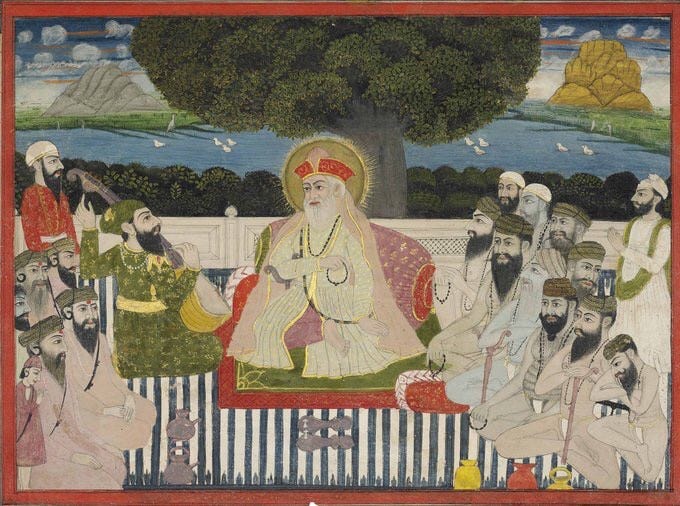- Reaction score
- 3,104
- Points
- 1,160
Doesn’t fit the “monolithic organization of exclusion and hate” narrative.I'm kind of surprised this hasn't been shouted from the rooftops.

Doesn’t fit the “monolithic organization of exclusion and hate” narrative.I'm kind of surprised this hasn't been shouted from the rooftops.
I meant from the CAF itself, not the GoC.Doesn’t fit the “monolithic organization of exclusion and hate” narrative.
Yup, but feel free to assume the worst of my motivation, its standard.I think Kat meant from the media,.......cause clickbait et al.
Guessing he didn’t have a history degree, lol.I remember a Chaplain questioning whether Sikh beliefs are compatible with military service.
Was he questioning Sikh beliefs or your interpretation of them being compatible with the CAF?I remember a Chaplain questioning whether Sikh beliefs are compatible with military service.
The Khalsa itself - there's not really a concept of 'your interpretation'.Was he questioning Sikh beliefs or your interpretation of them being compatible with the CAF?
Pretty weird comment from the Padre. Off the top of my head I can't think of a major religion that doesn't preach peace while also having some kind of warrior culture. For a 'turn the other cheek' type Christians have a long history of aggressively attacking people.The Khalsa itself - there's not really a concept of 'your interpretation'.
You're either initiated & following Maryada (code) or not.
That's cool. Is there a chapter in the Maryada about how a Sikh should treat other people?The Khalsa itself - there's not really a concept of 'your interpretation'.
You're either initiated & following Maryada (code) or not.
So how does that align with the CAF? I am more familiar with Islamic belief based on the Koran, Hadiths and jurisprudence.The Khalsa itself - there's not really a concept of 'your interpretation'.
You're either initiated & following Maryada (code) or not.
Not really since "other people" is a nebulous term.That's cool. Is there a chapter in the Maryada about how a Sikh should treat other people?
Does Canadian jurisprudence allow the exclusion of any religious group?So how does that align with the CAF? I am more familiar with Islamic belief based on the Koran, Hadiths and jurisprudence.
"The strategy relies largely on the definition of Islamophobia created by the Ontario Human Rights Commission, namely: "stereotypes, bias or acts of hostility towards individual Muslims or followers of Islam in general. In addition to individual acts of intolerance and racial profiling, Islamophobia leads to viewing Muslims as a greater security threat on an institutional, systemic and societal level.""Pretty weird comment from the Padre. Off the top of my head I can't think of a major religion that doesn't preach peace while also having some kind of warrior culture. For a 'turn the other cheek' type Christians have a long history of aggressively attacking people.
Every religion is a political, social construct, limiting and directing it's followers actions in this world. I more interested in real conflicts between teaching and current CAF polices and was hoping you could give me some samples. I am quite aware that the Sikhs have a long history of warfare and that is woven into the culture. I would like to hear from you where you have found friction points between the two.Not really since "other people" is a nebulous term.
All people are not the same, and it would be disingenuous to claim otherwise.
Does Canadian jurisprudence allow the exclusion of any religious group?
If not then there's no point in worrying about it.
Aligning with the CAF means a willingness to listen and provide advice on integration/accommodation.
"The strategy relies largely on the definition of Islamophobia created by the Ontario Human Rights Commission, namely: "stereotypes, bias or acts of hostility towards individual Muslims or followers of Islam in general. In addition to individual acts of intolerance and racial profiling, Islamophobia leads to viewing Muslims as a greater security threat on an institutional, systemic and societal level.""
---
Just a morally righteous attitude combined with a comfortable status quo.
A Christian Chaplain won't lead Islamic prayers, and the idea that Sikhs have a similar attitude is what sparked the comments.
A Khalsa Sikh is already initiated to both defend the faith and administer spiritual affairs.
Sant-Sipahi, Saint-Soldier, Warrior-Priest.
A Chaplain is both a religious figure, and a commissioned officer.
While the latter is necessary the former has no relevance.
ਏਕਓਰਭਯੋਖਾਲਸਾਏੇਕਓਰਸੰਸਾਰ॥
The Khalsa stands on one side; the world on the other.
Let me think on it, but haven't found much conflict on the policy side.Every religion is a political, social construct, limiting and directing it's followers actions in this world. I more interested in real conflicts between teaching and current CAF polices and was hoping you could give me some samples. I am quite aware that the Sikhs have a long history of warfare and that is woven into the culture. I would like to hear from you where you have found friction points between the two.
1. Guru Granth Sahib - Aad Guru Granth, Dasam Guru Granth & Sarbloh Guru Granth Sahib.So what are the equivalents in Sihkism?
Koran = Holy book (actually about 4 versions, down from about 2,000)
Hadiths = teachings of the prophet (as decided by committee after his death)
Jurisprudence = legal precedent based off of interpretation of the Hadith
Most of those things aren't translated.Thanks, time for some reading now.

I don't think so.Not really since "other people" is a nebulous term.
All people are not the same, and it would be disingenuous to claim otherwise.
Let no corrupting talk come out of your mouths, but only such as is good for building up, as fits the occasion, that it may give grace to those who hear.
Do nothing from selfish ambition or conceit, but in humility count others more significant than yourselves.
Therefore encourage one another and build one another up, just as you are doing.
I don't think so.
I was thinking:
